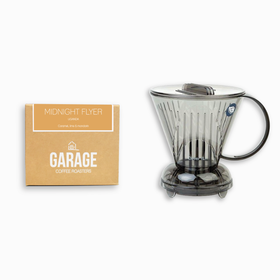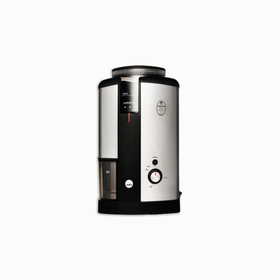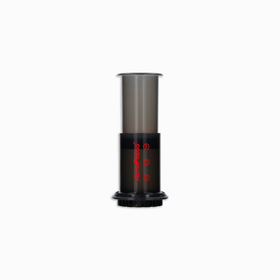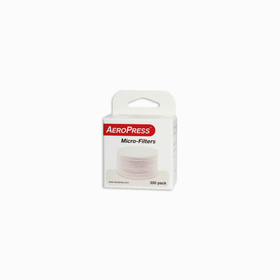
Maypole, Mexico/Uganda (Reusable 7.5kg Tub)
We are delighted to introduce our 7.5kg reusable tubs for wholesale customers, as we strive to cut down on single use packaging.
How does it work?
Place your order as normal, selecting the amount of 7.5kg tubs you would like. Your coffee will then arrive on your usual delivery date in tubs instead of bags.
Can I keep the tubs?
Unfortunately not. To make this scheme work, we need to make sure we get the tubs back - otherwise it kind of defeats the point. On your delivery day, make sure that you have all your empty tubs ready to collect. All boxes have a unique reference number, which we'll keep an eye on. Don't worry if your tub still has beans in, we'll just collect next time.
Is this scheme available to all wholesale customers?
If you are regularly hand delivered to by one of the Garage team, then yes! However, we aren't able to send these boxes by courier. If you're unsure or if you are out of our hand delivery zone but would love to use these tubs, then make sure you drop us a line to let us know and as soon as we can get you involved we will!
What if I lose a tub?
We hope that all our tubs out and about can be kept safe, but if one is lost, can't be returned or you even want to keep, then we will charge a £3+VAT per missing tub fee to cover the cost of replacing with a new one.
Tasting Notes
Roast Level: Medium
Process: Washed/Washed & silo dried
Varietal: Typica, Costa Rica 95, Catimor/SL14 & SL28
Roaster's Notes: This finely balanced blend makes for an espresso with notes of milk and dark chocolate, hazelnuts and orange with a very creamy mouthfeel.
Farm Info
Producer: 100 small scale producers/Agri Evolve
Region: Veracruz (municipalities of Cosautlan and Teocel)/Rwenzori Mountains, Uganda
Altitude: 1000 - 2000 masl
Background information - Dios Tigre, Mexico:
Cosaultlan and Teocelo are two neighbouring municipalities in the state of Veracruz, the 2nd biggest coffee producing state of Mexico and former 1st. In the 19th and 20th century this area was the heart of Mexican coffee. The cultivation of typicas under shade stood out in the international market for its quality. The economic stability of the region was highlighted by the construction of El Piojito railway which supported commercial exchanges.
Veracruz is traditionally a cherry trading state, meaning producers are used to selling cherries and not parchment. Historically, the Mexican coffee economy was under an oligarchy where 5 families of Spanish origin concentrated in the central Veracruz region, who had control of almost half of the nation’s coffee processing and sales. Small producers lacked the economic resources to have access to machinery and credit, so they had no other option but to sell their cherry coffee to the big mills, which kept coffee growers from developing post-harvest processes and favored the custom of selling cherries.
Teocelo means Tiger God in Nahuatl indigenous language. Pre-Hispanic times indicate that the tiger was considered a divinity, to which tribute was paid. Cosautlan is also from Nahuatl Kosauh-tlan which means the yellow place, or gold place.
In recent decades, Veracruz coffee has suffered a drop in production of up to 40%, and has lost the popularity and momentum it enjoyed in the past, due to the leaf rust, the lack of a competitive market, the shortage of labour and the scarcity of state support.
Leaf rust has started to change the coffee landscape of Veracruz, mostly at altitudes below 1,500 masl.
The fungus arrived in the area in 2015, and the experience of it in other Latin American countries predicted a devastation of many plantations within months. To tackle that threat, the Mexican government began distributing new varietals in the Catimor and Sarchimor families. Those varietals thrive best with sun and fertilizers, hence a slow shift from forest, heavily shaded plantations towards more sun-exposed coffee farms. However, the general landscape of Veracruz is nowhere near the green desert of monocultures. There is an imbued consciousness about the importance of diverse ecosystems, especially in the indigenous areas.
Dios Tigre is a combination of coffees bought as cherries and further processed by the producer group’s wet mill in Cosautlan, and coffees bought as parchment from producers who are starting to explore wet milling themselves.
Background information -Midnight Flyer, Uganda:
Midnight flyer is brought to us by Omwani coffee and Agri Evolve, and their longstanding efforts to support and uplift the Ugandan coffee market.
Staring in 2016 Agri Evolve originally opened as a collection point for both Dried Ugandan Arabica (DRUGAR) and cherries. Typically drying cherries on tarpaulin in the sun. Sourcing this DRUGAR was considerably easier in the beginning than trying to purchase ripe cherries, it turns out old habits do die hard!
Following investment in processing equipment, demonstration farms and hiring experienced staff. The second-year harvest was a drastic improvement in terms of sourcing unprocessed ripe cherries.
After this first season, processing facilities improved considerably and new equipment introduced, including; a washer separator, mechanical dryers, Hulling machine and green-houses - all introduced to the station.
The interest in Agri Evolve grew amongst the farming community as they were seen as a stable, reliable place to sell coffee, consistently paying good prices and always paid on time, which - as basic as it is - made a huge difference for farmers.
By the end of the second season Agri Evolve was given some outstanding reviews from a Japanese importer who thought the African Moon coffee was fantastic and "full of potential", which in turn kickstarted the interest in sourcing and processing high-quality Rwenzori Coffee.
Over the course of the next 5-years Agri Evolve rapidly expanded to become the largest employer in the Kisinga Region bringing new economic stability and job opportunities to the community. This growth was driven by an ever-increasing reputation for high-quality coffee from the Rwenzori Mountains.
With a focus on staff empowerment and education, Jonny managed to build the team to over 50 skilled individuals sourcing and processing coffee from thousands of farmers across the Rwenzori mountains. The focus in recent years has shifted to building a new station in Bugoye.
Introducing Buying Centres in strategic locations across the Rwenzori has been one of the catalysts for growth. Creating a constant physical presence encourages farmers that Agri Evolve is going to be there come the harvest, The convenient locations for farmers also drastically reduce the effort required to travel to market





